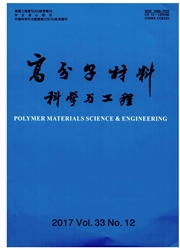

 中文摘要:
中文摘要:
以纳米SiO_2为核,通过表面接枝3-(三甲氧基硅丙基)二甲基十八烷基氯化铵,然后与壬基酚聚氧乙烯醚磺酸钠进行离子交换反应,得到室温可流动SiO_2离子纳米粒子。将粒子作为填料与聚苯硫醚(PPS)共混制备复合材料。透射电镜结果表明7%(质量分数)填充量时粒子均匀分散在PPS基体中;力学测试表明粒子能够提高PPS的断裂伸长率,7%填充量时弹性模量最大;断面扫描电镜结果表明SiO_2离子纳米粒子通过其表面有机长链离子聚合物与PPS基体相互作用能够提高材料的韧性。热重分析结果表明10%填充量能够降低复合材料的初始热分解温度,这可能与填充量高时,表面柔性分子链降低聚合物分子链刚性所致。
 英文摘要:
英文摘要:
In this paper,SiO_2 ion nanoparticles were fabricated via N,N-didecyl-N-methyl-N-(3-trimethoxysilylpropyl)ammonium chloride covalently grafted on the surface of SiO_2 nanoparticles as core,and then poly(ethylene glycol)4-nonylpheny 13-sulfopropyl ether sodium salt was grafted on the surface of SiO_2 nanoparticles through ion exchange reaction.The well-dispersed hybrid ion nanoparticles exhibit liquid-like behavior at room temperature.TEM result indicates that 7% loading nanoparticles disperse uniformly in polyphenylene sulfide(PPS)matrix.Mechanical tests show that SiO2 ion nanoparticles can elevate the elongation rate of PPS,and elastics modulus reaches the maximum value when the content is 7%.SEM of fraction of PPS nanocomposites further confirms that surface organic long chain ion polymer can interact with PPS matrix to improve the toughness.TGA results manifest that 10%loading decreases the initial decomposition temperature of nanocomposites,which is ascribed to the surface soft polymer chain of SiO_2 which can reduce the rigidity of PPS molecule chains.
 同期刊论文项目
同期刊论文项目
 同项目期刊论文
同项目期刊论文
 期刊信息
期刊信息
